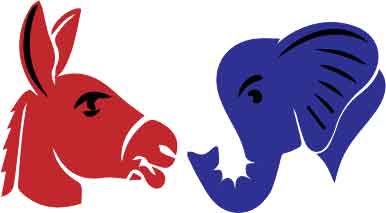Environmental Policy Forum
Candidates explain plans to keep our Earth green
An environmental forum was held at Lundeen Lecture Hall, room 103, in Doudna Hall. Kriss Marion, a democrat running for the State Senate in the 17th District and Mike Mooney, a democratic candidate running for State Assembly in the 49th District, were present. The forum was sponsored by the Green Campus Project. The candidates answered a series of questions pertaining to the environment that were brought forth by campus groups. The candidates were provided two minutes to respond to each question. AJ Landeau, the president of the Green Campus Project, was the host for the evening.
The candidates introduced themselves and spoke on why they have decided to run. Marion shared that she decided to run for office to clean up the water in Southwest Wisconsin. Marion is one of two women on the Lafayette County Board and a proponent for women’s empowerment. Mooney decided to run to restore our beautiful lands to their former glory. Mooney is a farmer, a fisherman and a hunter.
When posed with the first question of the night, ‘What are some ways you plan to address climate change in Wisconsin since much of our economy is dependent on our climate?’ Marion responded that she believes it is very real. She expressed that there has been flooding in the 17th district, and that this should be a wake-up call to people. Marion knows and believes that there are people on both sides of the political spectrum who want to work on climate change; they just need to work on a bipartisan agreement.
Mooney responded to the question by saying confined animal operations are part of the problem. He acknowledged that most people don’t like discussing this because of the heavy agricultural influence in this area, but he says what people don’t realize that it is one of, if not the largest contributing factor to climate change.
“This area has a group of diverse farmers, including organic, grass-fed, meat only, etc.” Mooney said. “There are ways that can both prevent economic collapse as well as environmental collapse and it’s really just thinking outside of the box.”
Another question that stood out was, ‘If you were in office, what would you do to protect our freshwater resources?’ Mooney said that government needs to talk to the people about the culture without missing out on the economic benefits of bringing people into this beautiful area. He wants to reach both cultural and economic aspects. An example Mooney pointed out was trout fishing in Grant County and how it brings in a minimum of a million dollars annually. This is possible because of the environmentally friendly area and the benefits that come along with its beauty.
Marion was eager to speak on this topic. She said that it’s hard to understand how special these areas are when people don’t live in them. Marion says that she will do anything to protect these areas and specifically, the frogs. According to her, people fail to realize that if frogs aren’t able to reproduce, then we aren’t okay. Digging up our wetlands and putting development on top of them makes it impossible for us to know how our ecosystems are doing.
One question the people who attended the forum found interesting one was, ‘What role does hunting play in our environment and economy and what do you see as the future for hunting in Wisconsin?’
“I think we have a great future for hunting in Wisconsin,” Mooney said.
He proceeded to say that some people think hunters in Wisconsin are suffering. He elaborated by explaining some of the issues that hunters and fishermen have to deal with, such as not being able to fish in certain areas, streams that are catch and release, fixed up streams that interfere with trapping, etc. Mooney explains that this is another cultural issue that requires a broader view of the bigger picture.
Marion continued by saying people don’t value or invest in public lands. The DNR has had a lot of money taken away from them and no matter how people feel about them, they are there to protect the nature and the environment specifically for hunting and fishing. They don’t have a large staff due to the cut-backs. This has resulted in our state and county parks becoming smaller and landowners gaining more land. This has become a big business for few people and it’s not benefiting the working class. Marion would like to find ways to reinvest in the working class, so that everything is available to them.
When asking why students attended the forum, many said it was offered as extra credit for a class, but one answer stood out.
“While it was offered as extra credit for a class, that wasn’t the only reason I came. I do really care about local environmental issues and because I’m not from this side of the state it was kind of cool to hear about some of the hot topics in this area,” senior environmental engineering major Katie Wardinsky said.




